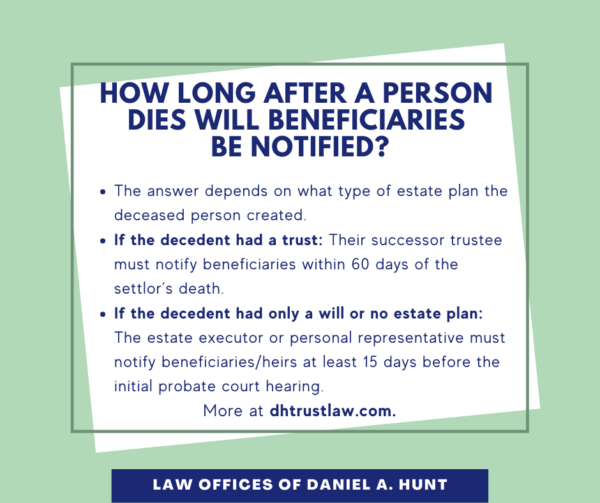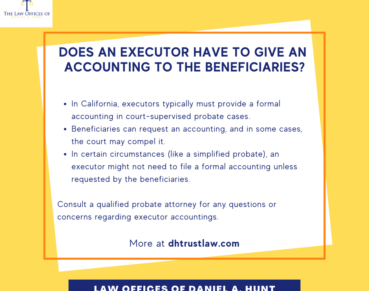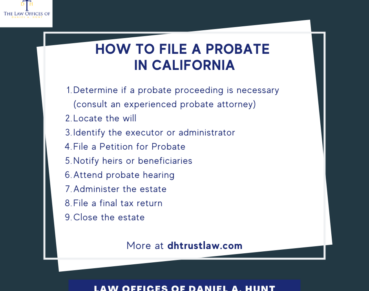How Long After a Person Dies Will Beneficiaries Be Notified?

When a loved one passes away and you believe they left you an inheritance, you may wonder when and how you will receive more information. How long after a person dies will beneficiaries be notified? The answer depends on the type of estate plan the deceased person created.
Beneficiaries of a Trust
If you are the beneficiary of a trust, the California Probate Code requires trustees to notify you within 60 days of the settlor’s death. Sometimes the trust settlor will also notify any disinherited heirs as well to avoid any ambiguity.
The trustee’s notice must include the following information:
- The identity of the settlor(s) and the date the trust was executed
- Name and contact information for the successor trustee(s)
- The location of the principal place of the trust administration
- Any other information that the trust requires to be shared
- A notice that the beneficiary is entitled to a complete copy of the trust document from the successor trustee
After the beneficiary receives this notice from the trustee, a statute of limitations begins. The beneficiary may not contest the trust more than 120 days from the date the notice was served or 60 days from the date the trust was delivered to them, whichever is later.
Beneficiaries of a Will
If you are the beneficiary of a Last Will and Testament or an heir of an intestate estate (where the person died without an estate plan in place), the estate executor or personal representative should notify you at least 15 days before the initial probate court hearing.
Under the California Probate Code, an interested party can file a petition for administration of the estate at any time after the decedent’s death. The court will then schedule a hearing up to 45 days after the petition is filed.
The petitioner must provide notice to the estate beneficiaries and heirs at least 15 days before the hearing date. The notice will include the following information:
- The name of the petitioner
- Location (meaning the county) where the estate administration will take place
- Notice of the time and location of the upcoming court hearing
- Notice that anyone who objects to granting the petition should appear (or send their attorney to appear) at the hearing to state any objections, or file written objections with the court before the hearing
- Notice that if the decedent had a will, it will be available for examination in the court file
Beneficiaries of a will also face a statute of limitations to contest the will under the Probate Code. Any will contests should be brought 120 days after the court issues the order either admitting the will to probate or determining the decedent to be intestate or 60 days after the proponent of the will first finds out about the will.
What Can a Beneficiary Do If They Don’t Receive Notice?
If you believe you are a beneficiary of an estate but have not received notice, contact the person administering the estate to request a copy of the trust or will. If they refuse to communicate with you or send you the requested information, you should quickly seek the advice of an experienced trust and estate litigation attorney. They can help you determine whether you have legal grounds to contest the matter.
Often the first step your attorney will take will be to write a demand letter requesting any information that previously should have been sent. Then they can help you evaluate your potential next steps and guide you to take actions most likely to yield the best results.
If you have any questions about this topic, feel free to contact our law firm.
Law Offices of Daniel A. Hunt
The Law Offices of Daniel A. Hunt is a California law firm specializing in Estate Planning; Trust Administration & Litigation; Probate; and Conservatorships. We've helped over 10,000 clients find peace of mind. We serve clients throughout the greater Sacramento region and the state of California.




